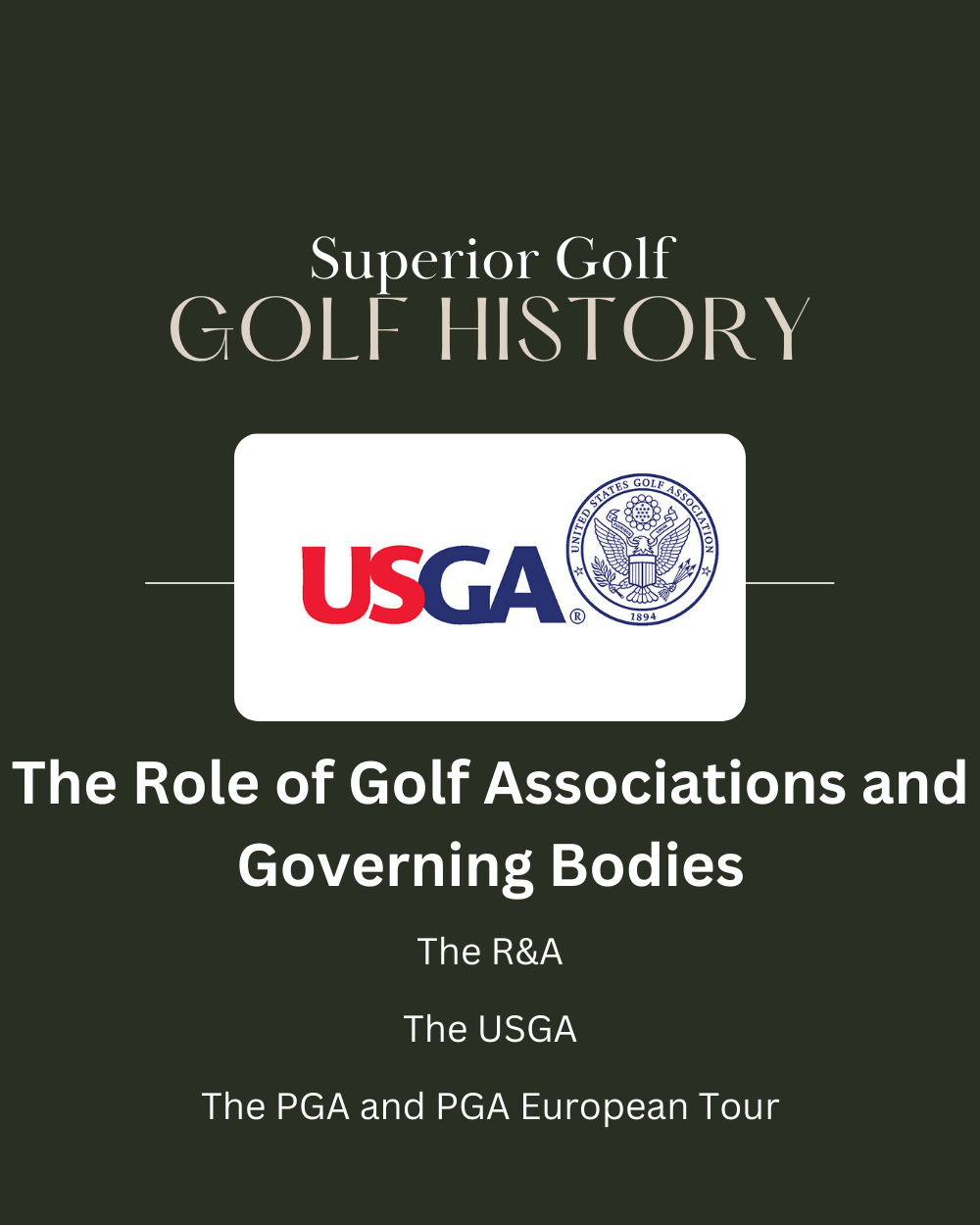The Role of Golf Associations and Governing Bodies: They organize tournaments and set the sport’s rules. Upcoming events, like the Open Championship managed by the R&A, draw attention to these organizations. The R&A, which has been separate from the Royal and Ancient Golf Club since 2004, is in charge of golf outside North America. They handle 21 championships and international matches every year.
On the other hand, the USGA takes care of golf in the United States and Mexico since 1894. It runs 14 national championships annually12. These organizations also work together to control the game, like limiting how far golf balls can go. Recently, they have been influential in the sport. They also impact pro golf, with the PGA Tour and DP World Tour possibly joining forces. This shows how they shape the game’s competitive side.
Key Takeaways
- Governing bodies are crucial for creating and enforcing the rules of golf.
- Golf associations are responsible for organizing prominent championships and tournaments.
- The R&A oversees golf activities outside North America, managing 21 championships annually.
- The USGSA, established in 1894, organizes 14 national championships each year within the United States and Mexico12.
- Emerging partnerships between the PGA Tour and DP World Tour highlight the evolving nature of professional golf.
Introduction to Golf Associations
Golf associations help shape the world of competitive golf and build a sense of community. They have been around since the mid-18th century, starting as elite clubs. Over time, they became key to organizing big events like The Open Championship and preserving the game’s integrity.
Every year, the R&A sets up 21 golf championships and international matches. This shows their big role in making golf popular worldwide3. Besides running championships, they also focus on making rules and standing up for the sport. The USGA, for another example, runs 14 tournaments yearly, keeping the sport’s standards high3.
History and tradition are big parts of these golf associations. They link today’s tournaments to the sport’s rich past. Golf’s presence in Scotland from as early as 1680 and regulation attempts in 1360 in Brussels are examples of this deep connection4.
The membership in these associations shows their role in golf’s popularity. The PGA, with over 7000 members worldwide, helps push the sport forward globally5. This large community ensures golf stays loved and keeps bringing in new talent.
Associations also focus on training future golf pros. The PGA Training Programme, for instance, lasts three years. It aims to uphold high standards in playing and managing the sport5. Programs like this show their commitment to improving both the players and the sport itself.
Governing Bodies
The governing bodies in golf play a vital role in the sport’s worldwide management.
The R&A
The R&A transitioned in 2004 to focus on governing golf outside North America. They have managed The Open Championship since 1920 and handle many international competitions. Through interpreting golf rules, like the ball distance limits, the R&A maintains the game’s competitive spirit and skill.
The R&A’s large size helps gather diverse skills. This promotes effective engagement in the global golf scene6.
The USGA
Since its establishment in 1894, the USGA began officially sanctioned championship golf in the U.S. It emphasizes traditions through events like the U.S. Open. The organization also supports the sport’s amateur roots and its professional aspects.
The USGA offers membership levels like the 1894 Club. These aim to improve golf’s playability, inclusivity, and environmental care. Benefits include USGA merchandise and championship discounts, raising the sport’s popularity and supporter involvement.
The USBA’s policies encourage teamwork and innovation in governing golf. This ensures the sport’s growth6.
The PGA and PGA European Tour
The PGA, unlike older governing bodies, focuses on professional golf’s commercial and competitive sides with the PGA Tour and its affiliates. Meanwhile, the PGA European Tour, a top professional golf league in Europe and globally, offers financial opportunities for players. Despite differences, the PGA Tour and PGA European Tour work together well. They even consider mergers, like with LIV Golf recently.
This cooperation ensures professional golf matches flourish worldwide. It leads to significant earnings for golfers.
Impact on the Sport
Golf associations play a key role in shaping the sport. They manage championships and promote fair play. This sets the quality and spirit of golf. Their political connections help enforce rules and grow professional golf7. The teamwork of R&A and USGA makes the game fair, setting up tough challenges for players8
Promoting sportsmanship is crucial, too. Events like The Open Championship boost the competitive vibe. They make us proud of our nation. This helps unite the host country and attract many visitors7. Big tournaments shine a spotlight internationally and bring economic benefits to their locations7.
It’s important to include everyone in golf. Many sports groups are fighting discrimination and supporting gender fairness. Yet, we need more diversity in leadership to reflect this effort better9.
The PGA showcases golf’s success and its worldwide appeal. It gives pros a stage to display their talents. This has helped golf become a global fan favorite and ensure its bright future8.
Conclusion
The future of golf deeply connects with its evolving rules and the protection of its traditions. The R&A, USGA, PGA, and PGA European Tour play key roles. They create the sport’s rules, run top tournaments, and help grow the sport worldwide. These groups bring about big changes, like new policies and research, showing how they match with common values and ethics10.
Golf honors its history while looking forward to new chances. The governing bodies tackle issues like the cost of following certain laws. One such law, the Government Performance and Results Act (GPRA), aims to better share information about research with the public11. Their ability to adjust to these changes is crucial for keeping golf’s honor and ensuring its growth.
As golf enters new partnerships and gains global focus, these organizations are ready to lead. They use new tech and social ideas to get people involved and make them aware of global effects12. Their commitment promises a bright, lasting future for golf. They have clear ways to check evaluations and improve communication for better decision-making11. By blending tradition with new technology, these groups keep golf growing and appealing to the next generations.
For more on writing a strong ending, see this detailed guide on writing a conclusion. To understand the role of conclusions in research, check out this resource. For a look at the worldwide effects of sustainable development, visit this analysis.
FAQ
What is the role of golf associations and governing bodies?
How do the R&A and USGA collaborate?
What distinguishes the R&A from The Royal and Ancient Golf Club?
What are some key functions of the USGA?
What is the significance of The Open Championship?
How does the PGA contribute to professional golf?
What role does the PGA European Tour play?
How do golf associations impact sportsmanship in the sport?
What are some membership options provided by the USGA?
How is the future of golf being shaped by its governing bodies?
Source Links
- https://en.wikipedia.org/wiki/United_States_Golf_Association
- https://www.golfmonthly.com/features/what-does-the-usga-do-in-golf
- https://www.directv.com/insider/the-difference-between-golf-organizations/
- https://www.britannica.com/sports/golf
- https://www.pga.info/media/1754/16industryguidelinesweb1204.pdf
- https://en.wikipedia.org/wiki/Governing_body
- https://www.sportanddev.org/latest/news/who-holds-power-sports-governance
- https://www.frontiersin.org/articles/10.3389/fspor.2022.1025023
- https://accelerate.sport/blog-post/the-role-of-sports-governing-bodies-in-promoting-diversity-and-inclusivity/
- https://govwrites.squarespace.com/writing-a-conclusion
- https://www.ncbi.nlm.nih.gov/books/NBK44121/
- https://www.citego.org/bdf_fiche-document-1294_en.html

